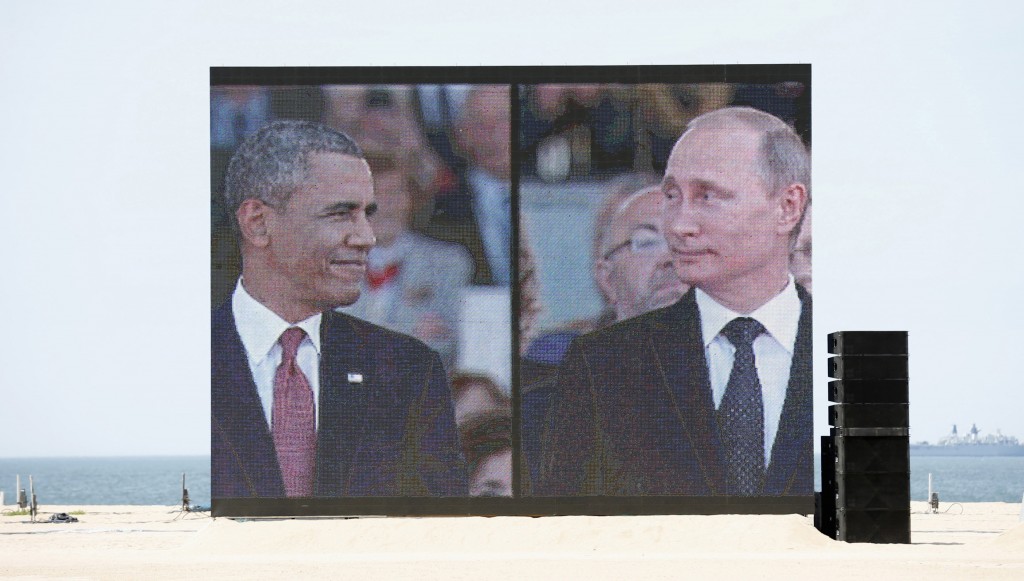People in the United States feel under threat, both from beyond our borders and within them. In fact, when asked about both U.S. President Barack Obama and Russian President Vladimir Putin, it was a pretty darn close call — 20 percent saw Putin as an imminent threat compared to 18 percent who said the same about Obama.
A recent Reuters/Ipsos poll asked more than 3,000 Americans what they see as some of the biggest threats to themselves and the country. You can slice and dice the information in literally hundreds of different ways here. People were shown a range of potential threats and then asked to rate how dangerous they were with one being no threat and five meaning the threat is imminent.
I think it’s safe to say that a national security expert might not agree with the public’s choices.
More people fear Boko Haram, a scary but ragged Islamic radical group in Nigeria that might have trouble paying for plane tickets to the United States, than Russia, which recently invaded a major European country. And a whopping 34 percent consider Kim Jong-un, the leader of impoverished North Korea, an imminent threat. Kim may have a couple of nukes, but otherwise his nation is a basket case, so poor that it relies on international aid to feed itself. Though considering how fast Sony Pictures pulled "The Interview” from theaters, I guess the public’s not alone in being afraid of the young man with the unique hairstyle.
Perhaps the most disturbing part, however, is how Americans view each other, simply because of the political party they favor. Thirteen percent of us see the Republican and Democratic parties as an imminent threat. That’s the same number who think the Chinese might be. Quick reality check: neither political party is the largest foreign holder of U.S. debt, nor could they cripple us economically in an afternoon. Nor has either party independently building an army that may soon be able to rival that of the United States — that we know of, anyway.
It’s also interesting to see that both sides of the political aisle are worried about themselves: 38 percent of Democrats and 42 percent of Republicans think their own party is something of a threat. Politics makes for strange bedfellows, but when you’re scared of the party you’ve gotten into bed with, something seems amiss.
Meanwhile, the world is certainly worried about the United States. In a Gallup survey of people in 65 countries, about one quarter named the United States as the greatest threat to world peace. Maybe that should not be so surprising, as only about half of Americans know which country was the only one to ever drop a nuclear bomb.
But the Reuters/Ipsos survey didn’t limit itself to "things that are imminent threats.” It also asked about "people who are imminent threats.”
Al Qaeda leader Ayman al-Zawahiri — the late Osama bin Laden’s replacement — came in as number one, which makes sense since al Qaeda is the only Islamic militant group to successfully strike inside the United States.
What made less sense is that Jihadi John, Islamic State’s on-camera executioner, who is largely a media creation, right down to his name, is seen as an imminent threat by 38 percent of respondents. The man himself is somewhere in Syria or Iraq and isn’t even willing to show his face to the public, though he’s proud to show his bloody work.
The final survey category asked Americans which beliefs, movements, trends or phenomena pose a threat. While millions of people are trapped in minimum-wage, part-time jobs that offer little hope of every leading to a better life, terrorism is still considered threat number one, pulling in an impressive 55 percent. (Nine percent of people say they’re not sure what the top threat is, and that’s fair enough since Reuters threw a buffet of scary choices at them).
The number two perceived threat is cyber attacks and cyber spying. It’s not clear from the questions whether people are more afraid of cyber snooping from overseas or by the National Security Agency here at home.
Should we be surprised that 25 percent of respondents see Islam as an imminent threat? Only 24 percent see global warming — a scientific certainty that will change the way everyone on the planet lives, and not for better — the same way.
But threats come and go in the public’s mind as events change, and perhaps the list reflects what people are hearing as much as what they’re thinking.
Syria’s Bashar al-Assad used to rank high in people’s imaginations. Only 17 percent see him as a threat now, but a year and half ago, Secretary of State John Kerry put him on a list he apparently keeps that also includes Adolph Hitler and Saddam Hussein. Today, despite being more alive than Hitler or Saddam, Assad is just "meh” to most of us.
Lower on the list of beliefs and movements we feel are imminent threats sit Judaism and Christianity (7 and 6 percent, respectively), thus pulling in all three major Western religions. Still, many Americans feel atheism is an even bigger threat — 12 percent.
Depressingly, people see gay rights (12 percent) and women’s rights (5 percent) as imminent threats. We haven’t come such a long way, baby.
We’re scared here in the home of the brave. We see danger everywhere, even viewing the religious beliefs of our neighbors and the expansion of basic rights to all Americans as imminent threats. There are real bad guys out there, monsters who would do us harm. But far too many of these survey results suggest we are also very scared of each other. Now that is a real threat.
(blogs.reuters.com)
ANN.Az
Follow us !











